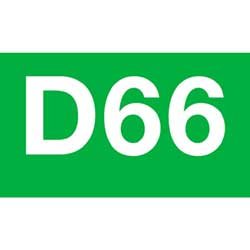Various chapters of the Dutch Democratic D66 party will submit a motion to party members at the April 18 D66 congress, to arrange the voting rights of Dutch nationals in the Caribbean Netherlands and abroad through an Electoral College. This writes The Daily Herald.
Persons with Dutch nationality living outside the Netherlands, and those residing in the Dutch public entities Bonaire, St. Eustatius and Saba are currently excluded from active voting rights for the First Chamber of the Dutch Parliament, the Senate. This is an unfair situation that needs to be changed according to the D66 chapters in, among others the United States, the United Kingdom, Germany, Belgium and Luxembourg, and also the D66 chapters in The Hague, Maastricht-Heuvelland, Sittard- Geleen, Nijmegen and the Foreign Region chapter.
The Senate handles affairs that touch Dutch citizens abroad, including the Dutch Caribbean countries and in the Caribbean Netherlands, yet these nationals have no say in that same Senate, Secretary of the D66 Foreign Region chapter Arthur van Benthem stated in a press release. This creates a situation of unequal treatment. Van Benthem, who lives in Philadelphia, said that the current VVD/PvdA government has barely displayed any effort when it comes to the (rights of) more than one million Dutch nationals living abroad. This group has been facing difficulties in the areas of nationality, government’s digital personal identification system DigiD, voting by internet, elections and those with a foreign partner.
In an effort to address this situation, and in light of next week’s indirect elections for the Senate through the Provincial States, the D66 chapters will be presenting a motion to the D66 members at the April 18 party congress.
In the motion, the D66 chapters ask the party’s representatives in the Second and First Chamber to urge the Dutch Government to accomplish indirect voting rights for Dutch nationals abroad and in the Caribbean Netherlands in the next Provincial States/ First Chamber elections of 2019.
This could be achieved by setting up an Electoral College (Kiescollege) that would be established every four years with the sole purpose of electing the members of the Senate. Only persons with the Dutch nationality would be able to vote for this Electoral College for which the Dutch Constitution has to be amended.
The Senate and also a majority in the Second Chamber are in favour of an Electoral College for the Caribbean Netherlands. The subject is the sole agenda point of a debate of the Second Chamber’s Permanent Committee for Home Affairs and Minister of Home Affairs and Kingdom Relations Ronald Plasterk next Tuesday.
Eelco Keij, a candidate on the Democratic Party D66 in the 2012 Second Chamber elections, who worked as an entrepreneur and fundraising strategist in New York and now works as fundraising specialist at the University of Nijmegen, said the motion served as a “strong signal” for The Hague to take the voting rights of all Dutch nationals abroad very seriously. “With this motion we want to prevent that the focus on achieving these voting rights is not lost. Dutch nationals abroad are the golden alumni of this country. We need to do something with that,” he told The Daily Herald. He expected the motion to be adopted at the D66 congress.
Keij presented his political manifesto “Fortunate Connections, the case for new political representation of Dutch nationals abroad” in The Hague in February last year. He has been actively championing the (voting) rights of Dutch nationals abroad for several years now.
The liberal democratic VVD party has clearly expressed its preference to establish an Electoral College for all Dutch nationals abroad. The Second Chamber approved a proposal of VVD Member of Parliament (MP) Joost Taverne in September last year, to ask Minister Plasterk to give his view on setting up an Electoral College for Dutch nationals living abroad. The minister sent this paper to Parliament in December 2014. Plasterk indicated during that debate in September that he did not fancy setting up an Electoral College for Dutch nationals abroad so they could vote for the Senate. He reconfirmed in a letter to the Dutch Parliament last February that the Dutch Government did not see the need for a fundamental discussion on the elections of the First Chamber and the influence of Dutch nationals abroad. In a meeting with the First Chamber in December, Plasterk said that creating an Electoral College for Dutch nationals abroad would “rock the very foundation of the Constitution” since this exercise would effectively separate the elections of the Senate from the provincial aspect.
 Archive of posts from Saba-News.com Archive Saba News
Archive of posts from Saba-News.com Archive Saba News
